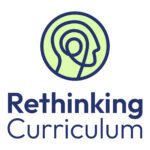 This article has been published as part of the Rethinking Curriculum project, kindly funded by The Helen Hamlyn Trust.
This article has been published as part of the Rethinking Curriculum project, kindly funded by The Helen Hamlyn Trust.
Sally Alexander MBE FCCT, Headteacher Kimichi School, UK
Chris Passey FCCT, Deputy Headteacher Kimichi School, UK
Introduction
Kimichi School is an independent music-specialist school based in Birmingham. We proudly serve a diverse cohort of pupils aged from 9 to 18. From its founding in 2014, music has not simply been a subject on a timetable or a tokenistic gesture, it has been the school’s heartbeat, shaping how we all see and experience teaching, learning and human flourishing.
In many educational settings, music is often marginalised or delivered sporadically as part of a carousel system. At Kimichi, we took the opposite approach: we began with music and built outward, ensuring that it sat at the centre of our curriculum. Music, we believe, provides a lush and fertile environment for cognitive development, emotional literacy, collaboration and resilience. We have seen music draw those students with ASD, ADHD and other neurodivergences out of their comfort zones, helping them to focus, ease their anxieties, sharpen their executive functions and transform them into students with real agency.
Schellenberg (2004) found that music lessons enhance IQ and academic performance in children, and, as a school, we have witnessed that integrating the arts into education boosts student engagement, motivation and persistence, particularly in at-risk or disengaged students (Deasy, 2002). Indeed, Rickard et al (2013), also note that music programmes can support emotional wellbeing, self-esteem and social inclusionAn approach where a school aims to ensure that all children are educated together, with support for those who require it to access the full curriculum and contribute to and participate in all aspects of school life, particularly for adolescents. Candidly, these studies only added to our gut-instinct around the efficacy of music for whole-child development, nevertheless, they add academic weight to our mission. Our commitment to music was therefore grounded in a belief that music should not be extracurricular, but co-curricular; intertwined with how children learn to express themselves, understand others and navigate the world.
Curriculum and Pedagogical Approach
From the outset, music was always going to feature as 25 per cent of the timetable, with students receiving at least two instrumental lessons per week as well as participating in orchestral ensemble, choir and small instrumental ensembles. We ensure this remains the case by timetabling these as lessons: for instance, Monday mornings always begin with orchestral ensembles, setting the tone for a new week with music and its benefits at the forefront.
Students are exposed to music explicitly through these mechanisms but also through the soft skills long associated with music education such as cooperation, empathy, the ability to work toward shared goals, active listening and turn-taking (Hallam, 2010). These skills are woven into our curriculum planning and design, ensuring that music studies fully complement our core offer. Alongside English and Maths, GCSE Music is also a core, mandatory subject. Such a clear focus on music from Year 5, means that the knowledge required for the GCSE, such as the identification and appreciation of varying styles and genres, can be fully embedded. Our offering of BTEC Music Technology has also been a natural evolution of the subject in response to our older students expressing a desire to stay for sixth form and expand their skills into employable abilities.
From a pedagogical standpoint, we are influenced by Vygotsky’s (1978) social constructivist theory and the Zone of Proximal Development. Learning music in a collaborative way – via duets, quartets or as part of a full orchestral ensemble – creates peer-supported zones where positive progress can be scaffolded by others. Eisner (2002) argues that “arts education teaches children that problems can have more than one solution” (p.70): at Kimichi, this flexible and interpretative view of learning is part of every child’s experience of school.
Our teachers are all musical in some way: from semi-professional orchestral players to deeply gifted enthusiasts, teachers at Kimichi instinctively understand the importance of not siloing music as a subject but actively envelop it into their daily teaching. Again, we’re not talking about singing times tables or learning the Element Song – instead, our teachers are encouraged through lesson and curriculum design to explicitly link our aforementioned soft skills gained from music education to their lesson content. Sometimes, through Physics (soundwaves and tuning forks) or even Geography and Biology (music in nature), subjects can have surprisingly obvious links to the easily assessed aspects of music.
This open approach is rooted in equity and inclusion. Often cited anecdotally, autistic students appear to perform well, both academically and socially, in schools where music is an explicit subject. As Ockleford (2012) argues, music can be a particularly accessible mode of learning and expression for autistic children. Indeed, several of our autistic and neurodivergent students, who were previously classed as Emotion Based School Refusers (EBSR), have fully engaged with our music-rich curriculum and increased their attendance by ≥ 90 per cent.
Implementation Journey
We have no money, let’s be clear about that. Whatever socially constructed privilege afforded to independent schools simply does not apply here. If it could be free, it would be. Instead, we have some of the lowest fees in the United Kingdom, with over 50 per cent of our students on a means-tested and/or musical-ability bursary that means they pay almost nothing. Such bursaries are not taken from a pot donated by an ‘Old Boy’ network of benevolence but are simply ‘monies not received’, offered inclusively rather than selectively.
This means that the implementation of a music-focussed curriculum has always been, and will always be, reliant on the goodwill and charity of others. Musical instrument donations, discounted repairs for our most ancient of string instruments, peripatetic teachers who accept a lower fee, support from our parental community in the form of sound equipment for our live events and donations from the players in the affiliated semi-professional outfit, Kimichi Symphony Orchestra. With over 100 player members, their support – from teaching to donations of tickets for our students and those in nearby schools – has been invaluable to our implementation journey. It is through these foundational relationships that the school has grown to the point of us needing to open a sister school in 2026.
At Kimichi, our implementation journey is iterative in nature. We engage in a continuous feedback and development cycle, adapting daily to students’ evolving needs. For example, an afternoon lesson can be swapped for an impromptu play/sing-a-long if some of the students require support regarding their emotional regulation. From such moments, we will often gain valuable insight into student musical preferences and use this feedback for future planning. Co-creation of our musical offering means that we aren’t chasing buy-in from our students, rather they sit in a position of mutual interest having played an integral part in its growth. Similarly, with such a stake in the school, this daily feedback means we can anticipate with more accuracy those initiatives and projects that might cause distress or undue challenge for our students. There is no need for pupil voice forms here – they come right out and tell you. Such a culture of transparency ensures that both implementation and de-implementation are agile, responsive, and meaningful for all parties.
Findings and Implications
What is success if not measured by some form of impact? As a small school, data can often be statistically insignificant, with the absence of one child disproportionately skewing results. Instead, our impact is measured in seeing our students stay with us from Year 5 – 11 and a growing number of them staying for Sixth Form. As we grew and musical pedagogies became more embedded into our curriculum, we have seen a year-on-year improvement in GCSE grades, particularly in English, Biology, Geography, Music and increasingly Maths. We believe that this is potentially due to the cognitive and linguistic benefits of musical learning (Patel, 2008), however, long term trends – spanning over ten years – will require more robust analysis.
Beyond data, our impact can also be measured in the unprompted feedback from parents who feel moved to email the school:
“My eldest attends Kimichi school and I am perpetually amazed by the impact the school has had on him. The inclusivity, passion for learning and music, the clear feel of community that pervades the school, and the support from members of staff as well as classmates to one another is remarkable.
Ben had a tricky time in ‘conventional’ education with his needs not being fully met and his learning suffering as a result. Since being at Kimichi for a year I can, without reservation, say the school has been the making of him.
He is much more confident in both himself and his abilities. He also has a close knit group of friends around him that extend throughout the year groups of this magical establishment.
On first experiencing the school via a visit with Sally & Chris (Head and Deputy) I had to describe it as ‘a musical Hogwarts’ – much to their delight. My view hasn’t changed at all.
I could not sing the praises of Kimichi, the staff, or the students any higher.
A remarkable, remarkable place run by incredibly talented, dedicated, and wonderful people. Bravo.”
Parents who engage positively with the school and its musical ethos – from attending and helping at concerts to volunteering at the school – see a dramatic improvement in the attainment of their own child and those around them. The social benefits of bringing people together have been so evident to us that Phoenix Music Mondays, a monthly concert series featuring outstanding local talent, is about to finish its second year having reached in the region of 1000 members of the community, helping them engage with music in a way they may not have before.
We do, however, recognise limitations and a certain level of privilege. Much of our evaluation remains qualitative and long-term tracking is needed. We also recognise that not all schools can afford full-time specialist music staff or orchestral provision. Yet, we believe that the principle – music is more than a subject – can be translated in scalable ways. Even a small shift, such as daily singing or rhythm-based transitions, can yield benefits.
Music is not a luxury. It is a language, a tool for thinking and a powerful medium for inclusion. At Kimichi, we have found that putting music at the centre of our curriculum has not only enriched learning, it has transformed it, along with the lives of those who encounter it.
References
Deasy, R J (Ed.). (2002). Critical Links: Learning in the Arts and Student Academic and Social Development. Arts Education Partnership. https://www.artsedsearch.org/resource/critical-links-learning-in-the-arts-and-student-academic-and-social-development/
Eisner E (2002) The Arts and the Creation of Mind. Yale University Press.
Hallam, S (2010) The power of music: Its impact on the intellectual, social and personal development of children and young people. International Journal of Music Education, 28(3), 269–289. https://doi.org/10.1177/0255761410370658
Ockelford A (2012) Music, Language and Autism: Exceptional Strategies for Exceptional Minds. Jessica Kingsley Publishers.
Patel A D (2008) Music, Language, and the Brain. Oxford University Press.
Rickard, N S, Appelman, P, James, R, Murphy, F, Gill, A, & Bambrick, C (2013) Orchestrating life skills: The effect of increased school-based music classes on children’s social competence and self-esteem. International Journal of Music Education, 31(3), 292–309. https://doi.org/10.1177/0255761411434824
Schellenberg, E G (2004). Music lessons enhance IQ. Psychological Science, 15(8), 511–514. https://doi.org/10.1111/j.0956-7976.2004.00711.
Vygotsky L S (1978) Mind in Society: The Development of Higher Psychological Processes. Harvard University Press.


 This article has been published as part of the Rethinking Curriculum project, kindly funded by The Helen Hamlyn Trust.
This article has been published as part of the Rethinking Curriculum project, kindly funded by The Helen Hamlyn Trust.







